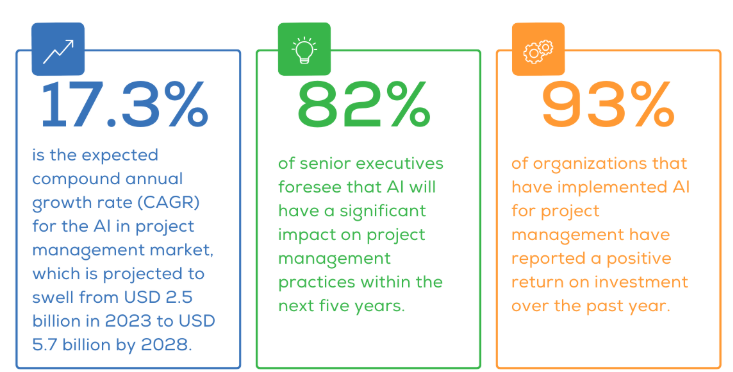Introduction
Did you know that 92% of product managers (PM) say that AI is bound to have a long-lasting impact on product management? With AI product manager jobs becoming more in demand, you can stand out from the competition by having a good understanding of AI as a PM. By following some key strategies, you can become a successful AI product manager and ensure that organizations get the right guidance from your expertise. For instance, you can optimize the product lineup, increase productivity, reduce costs, and implement automation in operations wherever required. This will make you the most sought resource amongst the heavy competition. Following the right method and implementing an appropriate AI product strategy is key to ensuring business success.
In this blog, you will learn:
- ● Define clear AI objectives (ensure that they align with the business goals)
- ● Choose the right AI technology stack
- ● Develop a robust data strategy
- ● Implement AI in pilot projects before scaling
- ● Prioritize Ethical AI
- ● Implement AI testing and quality check
- ● Plan for scalability and future growth
Define clear AI objectives (ensure that they align with the business goals)
There is an increasing allure for AI PMs in the current market as 8% of graduates from Harvard Business School have secured jobs as AI PMs. As an aspiring AI PM, the core requirement and expectation from organizations is your ability to integrate AI into the product stack with very minimal or no impact on operations. To achieve this, you need to start off by having sound knowledge of the product and understand all the nuances that cover the product.

As an AI PM, you need to measure the key effectiveness of using the company’s AI and set KPIs using metrics like AI adoption rate, operational efficiency gains, and customer satisfaction (CSAT). The AI adoption rate measures the proportion at which businesses and their workforce deploy AI in their daily operations. In operational efficiency gains, you need to measure the AI’s success by evaluating automation, cost reduction, and resource optimization. CSAT is an AI-based metric to measure customer satisfaction and ensure quality. Once you set up these parameters for measurement, it will be easy for you to proceed with other processes.
Choose the right AI technology stack
You need to automate support workflows to ensure enhanced efficiency by implementing suitable AI models and platforms. While choosing the right model, you need to focus on business needs, the organization’s work culture, and current operational efficiency. Use generative AI technology or GAI technology that generates images, new text, and music by boosting creative output and customizing results. Implementing large language models for content development and support services. Try and incorporate machine learning frameworks like TensorFlow and PyTorch platforms to ensure the effective use of AI models.
Using AI development platforms like Google Vertex AI or Hugging Face helps simplify AI development by providing a complete set of tools to build, train, and release models to production. Another vital KRA for an AI PM is to ensure that business systems work in sync with AI technology and produce a satisfactory output. You need to ensure that AI tools integrate with CRM systems and other business platforms. Check if the connection between AI models and their data sources ensures fast data flow. Also, the AI model must be able to operate better while handling new information and should be able to handle rising data volumes as well as updated business operations without hampering daily work.
Develop a robust data strategy
A seasoned AI product manager ensures that AI systems work with good-quality data and ensures the precision of data while following legal requirements. They ensure data consistency and data correctness across many platforms. All the essential information needs to be recorded by the system to ensure appropriate data analysis. The system should follow a diverse approach during evaluation to ensure unbiased results. As an AI PM, you need to deploy an efficient data engineering team to validate and normalize data while removing irregularities. Also, data minimization, consent management, and transparency are key to establishing a robust data strategy.
Implement AI in pilot projects before scaling
Many new methods are now being implemented across industries but the tried and tested trial and error method in AI product management is a fool-proof way to ensure success. Testing AI models through pilot projects helps businesses to improvise on models before they go live. It also helps in proactively addressing problems and fine-tuning their AI systems to ensure success. While implementing a pilot project, you need to perform adequate risk mitigation, refine operations, and mitigate stage-outs to ensure cost efficiency.
Establish a cross-functional AI team
A core AI team is pivotal to ensuring the success of an AI product strategy. You need to set up an organization that links AI development with operations and ensure that customer success teams learn AI skills through teamwork. Interdisciplinary collaboration and strategic alignment are key to establishing a strong cross-functional AI team.
Prioritize ethical AI implementation
With several concerns raised on social media and lots of news articles on the web questioning the ethical use of AI, you need to be super cautious while implementing the AI product strategy as an AI PM. You need to maintain open information to build trust and train AI models on various data types to produce inclusive and unbiased output. You can implement explainable AI technology or XAI that helps users receive explanations about AI decision-making and establish trust to ensure fairness in operations. More focus needs to be employed towards making algorithms more open and fixing automated tools that are prone to biases.
Implement AI testing and quality check
Establishing a concrete quality management system is key for a successful AI product manager. You need to deploy a structured approach to testing, quality assurance, and continuous monitoring. Ensure that AI models are under the radar by constantly testing to ensure performance, accuracy, security, and ethical use. An effective way to establish this is by implementing automated testing, updating models, tracking security updates, and eliminating unfair behavior.
Plan for scalability and future growth
AI product management is an art. Building an AI model that is flexible to adapt new technologies like IoT, blockchain, and AR/VR are key to improving business processes. You need to establish interconnected AI systems that combine future technology platforms to improve business automation tools. There should also be a key focus on customer experience automation and data-driven decision making.

Choosing the right AI product management course can be quite daunting for aspiring AI PMs. Eduinx offers the right platform for you to kickstart your career as an AI product manager. We have a team of non-academic mentors with over a decade of experience in AI and data science. They are here to guide you in understanding complex concepts through a hands-on practical approach. You can also get career guidance and assistance with job placements through our 360-degree career support. Get in touch with us here for more information on the AI product management course.
Reference links:
https://www.kommunicate.io/blog/ai-product-management-success-strategies/




